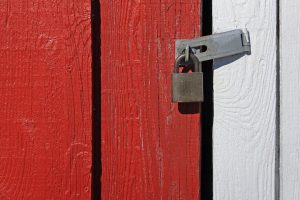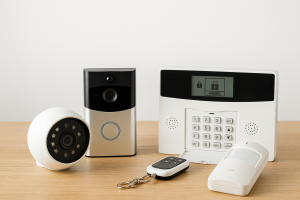Your home should be your safe haven, but without the right security measures, it can become vulnerable. You might think home security is complicated or expensive, but small changes can make a big difference.
Imagine feeling completely at ease whether you’re inside or away, knowing your loved ones and belongings are protected. You’ll discover simple, effective tips that anyone can use to boost home security immediately. Keep reading to unlock easy ways to make your home a fortress you can trust.

Credit: www.instagram.com
Essential Home Security Measures
Essential home security measures protect your family and belongings. A secure home stops intruders before they enter. Simple steps create a safer living space. Focus on strong locks, secure windows, and good lighting.
Strong Locks And Deadbolts
Use high-quality locks on every door. Deadbolts add an extra layer of protection. Choose locks that resist picking and bumping. Change locks after losing keys or moving in. Reinforce door frames for added strength.
Secure Windows And Doors
Windows are common entry points for burglars. Install sturdy window locks and use security bars if needed. Keep doors solid and free of gaps. Use strike plates with long screws to prevent force entry. Avoid leaving windows open or unlocked.
Outdoor Lighting Tips
Bright outdoor lights deter intruders and increase visibility. Place lights near entrances and dark corners. Motion-sensor lights save energy and surprise trespassers. Use warm white bulbs for a welcoming effect. Maintain lights regularly to ensure they work properly.

Credit: www.instagram.com
Advanced Security Technologies
Advanced security technologies offer more than just basic protection; they provide you with real-time control and peace of mind. With these tools, you can monitor and secure your home from anywhere, making it harder for intruders to catch you off guard. Are you ready to see how technology can boost your home’s safety?
Smart Security Systems
Smart security systems connect all your security devices into one easy-to-manage platform. You can control locks, lights, cameras, and alarms through your smartphone or voice assistant. Imagine locking your doors and checking your home’s status while sitting at a café miles away.
Many systems offer customizable alerts, so you only get notified about what matters most to you. This reduces false alarms and keeps you focused on real threats. How often do you check your security system? With smart tech, it becomes effortless and routine.
Surveillance Cameras
Surveillance cameras are more than just recording devices—they act as your eyes when you’re not home. Modern cameras offer HD video, night vision, and two-way audio, allowing you to see, hear, and even talk to visitors or potential intruders. This feature has stopped me from opening the door to a suspicious visitor more than once.
Position cameras at entry points, driveways, and blind spots to cover vulnerable areas. Many cameras now come with cloud storage, so you don’t have to worry about losing footage. Do you know exactly where your cameras capture activity around your home?
Motion Sensors And Alarms
Motion sensors detect unusual movement and immediately trigger alarms or alert your phone. These devices can be placed indoors or outdoors to cover windows, doors, and hallways. I once had a motion sensor catch a raccoon trying to sneak into my garage—talk about unexpected help!
Look for sensors with adjustable sensitivity to avoid false alarms from pets or passing cars. Pairing alarms with sensors creates a strong deterrent and alerts you quickly if something’s wrong. What’s your current response plan if an alarm goes off while you’re away?
Safety Habits And Practices
Ensuring the safety of your home requires adopting effective security habits. These practices can significantly reduce the risk of break-ins. By integrating simple but powerful routines, you can enhance your home’s security.
Routine Security Checks
Conduct regular security checks around your home. Ensure all windows and doors are locked before leaving. Inspect locks and latches for wear and tear. Test smoke detectors and alarms monthly. Keep emergency contact numbers handy. These practices help maintain a secure environment.
Safe Key Management
Manage your keys wisely to prevent unauthorized access. Avoid hiding spare keys under mats or flower pots. Use a lockbox for extra keys. Change locks if keys are lost. Share keys only with trusted individuals. These strategies safeguard your home from intruders.
Neighborhood Watch Involvement
Join a neighborhood watch group for added security. Stay informed about local security issues. Communicate with neighbors about suspicious activities. Attend community safety meetings. This collective vigilance enhances overall neighborhood safety.
Protecting Against Common Threats
Protecting your home from common threats is vital for safety and peace of mind. Many risks can harm your family and property. Understanding these threats helps you act wisely and stay secure.
Simple steps can reduce danger and make your home less vulnerable. Focus on key areas like burglary, fire hazards, and suspicious activities. Being alert and prepared makes a big difference.
Preventing Burglary
Burglary is a serious risk for many homes. Secure doors and windows with strong locks. Use deadbolts and reinforce frames to stop forced entry.
- Install motion sensor lights around your home.
- Keep valuables out of sight from windows.
- Use a security alarm system with loud sirens.
- Trim bushes and trees near entry points.
Neighbors watching out for each other also helps prevent crime. Join or create a neighborhood watch group.
Fire Safety Tips
Fire can cause severe damage and injury. Have smoke detectors on every floor and test them monthly. Replace batteries yearly to keep them working.
- Keep fire extinguishers in the kitchen and near exits.
- Never leave cooking unattended on the stove.
- Store flammable items away from heat sources.
- Create and practice an escape plan with your family.
Regularly check electrical wiring and appliances for damage. Faulty wiring can spark dangerous fires.
Handling Suspicious Activity
Noticing unusual behavior near your home requires caution. Trust your instincts and stay calm. Do not confront strangers directly.
- Document details such as appearance, time, and actions.
- Inform local police about suspicious persons or vehicles.
- Use security cameras to monitor your property.
- Alert neighbors to increase community awareness.
Quick and careful reporting can prevent crimes before they happen. Always prioritize safety over curiosity.
Securing Outdoor Spaces
Securing your outdoor spaces is a crucial part of home security. These areas often serve as the first line of defense against unwanted visitors. By focusing on key elements around your yard and property, you can create a safer environment for your family and belongings.
Fencing And Gates
Strong fencing acts as a physical barrier that deters intruders. Choose materials that are difficult to climb or cut, such as metal or thick wood. Ensure gates have sturdy locks and consider adding an alarm sensor for extra protection.
Have you checked if your fence has any weak spots recently? Even a small gap or loose panel can invite trouble. Regular maintenance keeps your perimeter secure and gives you peace of mind.
Garage And Shed Security
Garages and sheds often contain valuable tools and equipment that burglars target. Install high-quality locks on all doors and windows, and add motion-sensor lighting to discourage nighttime prowlers. If you leave your garage door remote in the car, think about a more secure storage option.
Think about the last time you left your garage open or unattended—could someone have easily walked in? Taking simple steps like securing these outbuildings reduces risks significantly.
Landscaping For Safety
Landscaping can either help or hurt your home’s security. Keep bushes and trees trimmed to eliminate hiding spots near windows and entrances. Plant thorny shrubs under ground-floor windows to create a natural barrier that’s hard to cross.
Do you know which plants around your house make it easier for someone to approach unnoticed? Adjusting your landscaping not only improves curb appeal but also strengthens your home’s defense.

Credit: www.instagram.com
Securing When Away
Leaving your home unattended can raise security risks. Taking steps to protect your house while away is essential. Simple actions can prevent theft and damage. Planning ahead helps keep your home safe and gives you peace of mind.
Vacation Security Plans
Set a clear plan before leaving for vacation. Inform a trusted friend or family member about your trip. Ask them to check your house regularly. Stop mail and newspaper deliveries or have someone collect them. Uncollected mail signals an empty home to burglars. Make sure all doors and windows are locked tight. Consider installing security cameras for remote monitoring. These steps create a strong defense during your absence.
Using Timers For Lights
Timers control your lights automatically at set times. They make it look like someone is home. Use timers on indoor and outdoor lights. Change the schedule often to avoid patterns. Random light activity confuses potential intruders. Timers are an affordable and easy security tool. They add a layer of protection without extra effort.
Trusted Neighbor Assistance
Ask a reliable neighbor to watch your house. They can collect mail and check for suspicious activity. Neighbors can also park a car in your driveway. This presence deters unwanted visitors. Share your contact information with them. Let them know when you will return. Friendly neighbors are a valuable part of home security.
Frequently Asked Questions
What Are The Best Home Security Systems Available?
The best home security systems offer 24/7 monitoring, smart device integration, and easy installation. Popular options include ADT, SimpliSafe, and Ring. Choose a system that fits your budget and home size for optimal protection.
How Can I Secure My Home Entrance Effectively?
Use solid doors with deadbolt locks and install a peephole or security camera. Adding motion sensor lights near entrances also deters intruders. Regularly check and reinforce weak points to enhance security.
Are Smart Home Devices Safe For Home Security?
Yes, smart devices improve home security by providing remote monitoring and alerts. Ensure devices use strong passwords and regular updates to prevent hacking. Choose products from reputable brands for added safety.
How Important Is Outdoor Lighting For Home Security?
Outdoor lighting is crucial as it deters burglars by eliminating hiding spots. Use motion-activated lights around entry points. Well-lit exteriors increase visibility and reduce the risk of break-ins.
Conclusion
Keeping your home safe is important for peace of mind. Simple steps like locking doors and windows help a lot. Use good lighting around your house to scare off intruders. Install alarms and cameras for extra protection. Talk to neighbors and watch out for each other.
Stay aware and update your security regularly. Small efforts make a big difference in safety. Protect your home with smart choices every day. Safety starts with you.







